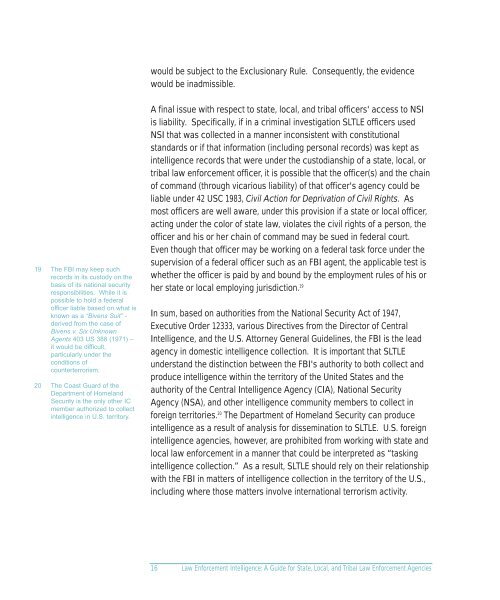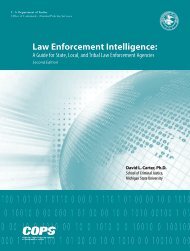Law Enforcement Intelligence - Cops - Department of Justice
Law Enforcement Intelligence - Cops - Department of Justice
Law Enforcement Intelligence - Cops - Department of Justice
Create successful ePaper yourself
Turn your PDF publications into a flip-book with our unique Google optimized e-Paper software.
19 The FBI may keep such<br />
records in its custody on the<br />
basis <strong>of</strong> its national security<br />
responsibilities. While it is<br />
possible to hold a federal<br />
<strong>of</strong>ficer liable based on what is<br />
known as a “Bivens Suit” -<br />
derived from the case <strong>of</strong><br />
Bivens v. Six Unknown<br />
Agents 403 US 388 (1971) –<br />
it would be difficult,<br />
particularly under the<br />
conditions <strong>of</strong><br />
counterterrorism.<br />
20 The Coast Guard <strong>of</strong> the<br />
<strong>Department</strong> <strong>of</strong> Homeland<br />
Security is the only other IC<br />
member authorized to collect<br />
intelligence in U.S. territory.<br />
would be subject to the Exclusionary Rule. Consequently, the evidence<br />
would be inadmissible.<br />
A final issue with respect to state, local, and tribal <strong>of</strong>ficers' access to NSI<br />
is liability. Specifically, if in a criminal investigation SLTLE <strong>of</strong>ficers used<br />
NSI that was collected in a manner inconsistent with constitutional<br />
standards or if that information (including personal records) was kept as<br />
intelligence records that were under the custodianship <strong>of</strong> a state, local, or<br />
tribal law enforcement <strong>of</strong>ficer, it is possible that the <strong>of</strong>ficer(s) and the chain<br />
<strong>of</strong> command (through vicarious liability) <strong>of</strong> that <strong>of</strong>ficer's agency could be<br />
liable under 42 USC 1983, Civil Action for Deprivation <strong>of</strong> Civil Rights. As<br />
most <strong>of</strong>ficers are well aware, under this provision if a state or local <strong>of</strong>ficer,<br />
acting under the color <strong>of</strong> state law, violates the civil rights <strong>of</strong> a person, the<br />
<strong>of</strong>ficer and his or her chain <strong>of</strong> command may be sued in federal court.<br />
Even though that <strong>of</strong>ficer may be working on a federal task force under the<br />
supervision <strong>of</strong> a federal <strong>of</strong>ficer such as an FBI agent, the applicable test is<br />
whether the <strong>of</strong>ficer is paid by and bound by the employment rules <strong>of</strong> his or<br />
her state or local employing jurisdiction. 19<br />
In sum, based on authorities from the National Security Act <strong>of</strong> 1947,<br />
Executive Order 12333, various Directives from the Director <strong>of</strong> Central<br />
<strong>Intelligence</strong>, and the U.S. Attorney General Guidelines, the FBI is the lead<br />
agency in domestic intelligence collection. It is important that SLTLE<br />
understand the distinction between the FBI's authority to both collect and<br />
produce intelligence within the territory <strong>of</strong> the United States and the<br />
authority <strong>of</strong> the Central <strong>Intelligence</strong> Agency (CIA), National Security<br />
Agency (NSA), and other intelligence community members to collect in<br />
foreign territories. 20 The <strong>Department</strong> <strong>of</strong> Homeland Security can produce<br />
intelligence as a result <strong>of</strong> analysis for dissemination to SLTLE. U.S. foreign<br />
intelligence agencies, however, are prohibited from working with state and<br />
local law enforcement in a manner that could be interpreted as “tasking<br />
intelligence collection.” As a result, SLTLE should rely on their relationship<br />
with the FBI in matters <strong>of</strong> intelligence collection in the territory <strong>of</strong> the U.S.,<br />
including where those matters involve international terrorism activity.<br />
16 <strong>Law</strong> <strong>Enforcement</strong> <strong>Intelligence</strong>: A Guide for State, Local, and Tribal <strong>Law</strong> <strong>Enforcement</strong> Agencies





